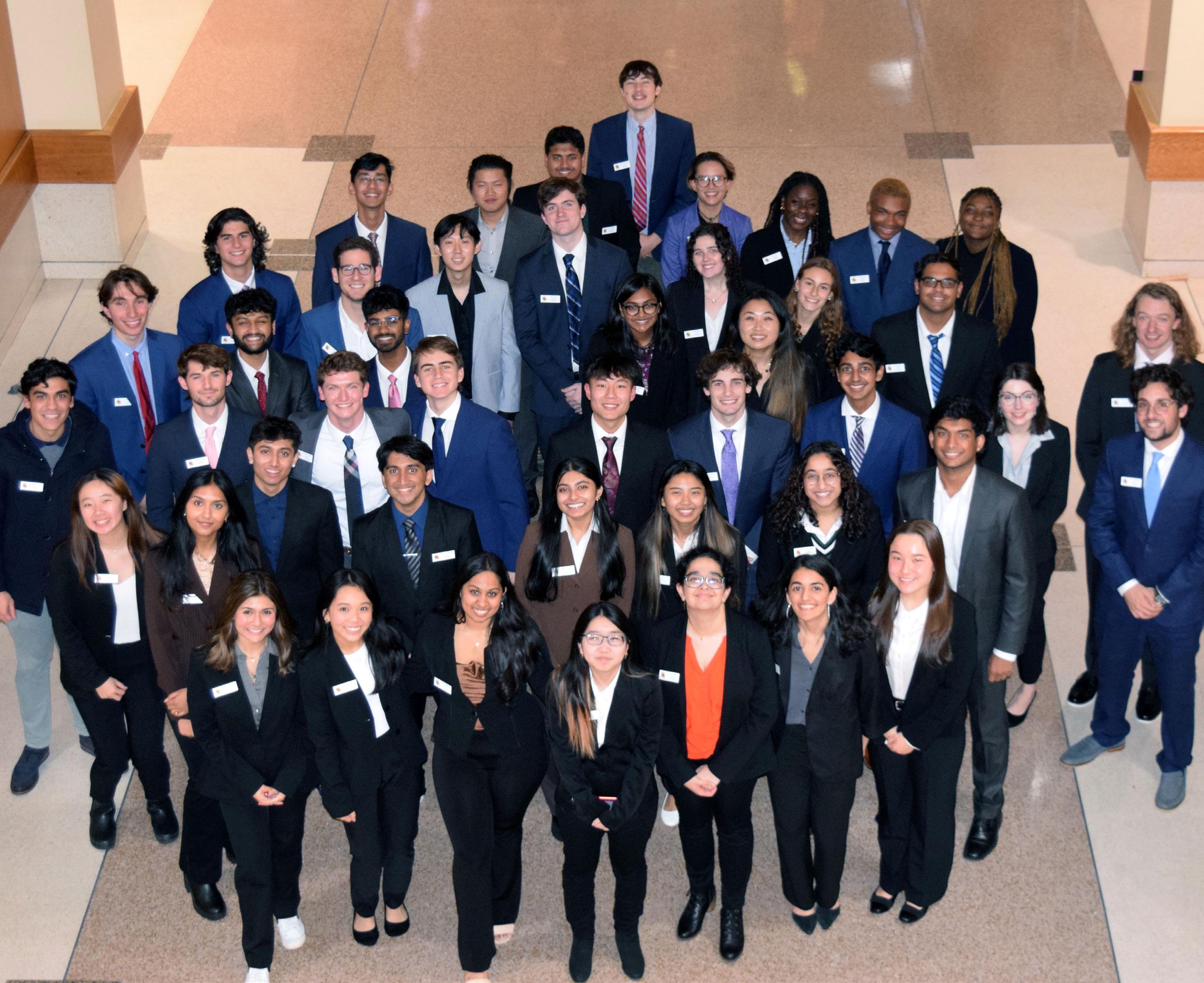
6 minute read
QUEST Classes
QUEST students take four required courses with their cohorts in addition to one elective. Students who complete all five courses earn a notation on their transcript and gain skills in teamwork, process improvement, systems thinking, product design and development, data analysis, and oral and written communication.
COURSE 1: BMGT/ENES190H Introduction to Design and Quality
Advertisement
This first QUEST course focuses on creative problem solving and teamwork. Students learn to work in multidisciplinary teams while designing solutions for two projects. Along the way, they learn and apply methods from design thinking, new product development, project management, quality management, and process improvement. Additionally, they learn how to prepare and deliver multiple types of presentations which they practice through a product pitch, poster session, and client briefings.
In the first project, each team was given a different type of user, and they had to apply design thinking to identify a need for this user and develop a new product idea to address the need. Teams developed solutions for users that included unhoused populations, young professionals, and busy moms.
For the second project, teams used lean six sigma methods and design thinking to help a campus client improve a business process. The teams not only learned about process improvement, but they also practiced consulting with a client. The teams were highly engaged with their clients and delivered valuable recommendations. Our clients included the Division of Student Affairs, Terrapin Works, the Maryland Athletics Compliance Department, and Engineering Career Services.
While this first QUEST course introduces students to design and quality through problem solving and teamwork, students come away with much more. Many students say that the course expands their thinking and helps them appreciate new perspectives and see the world in new ways.
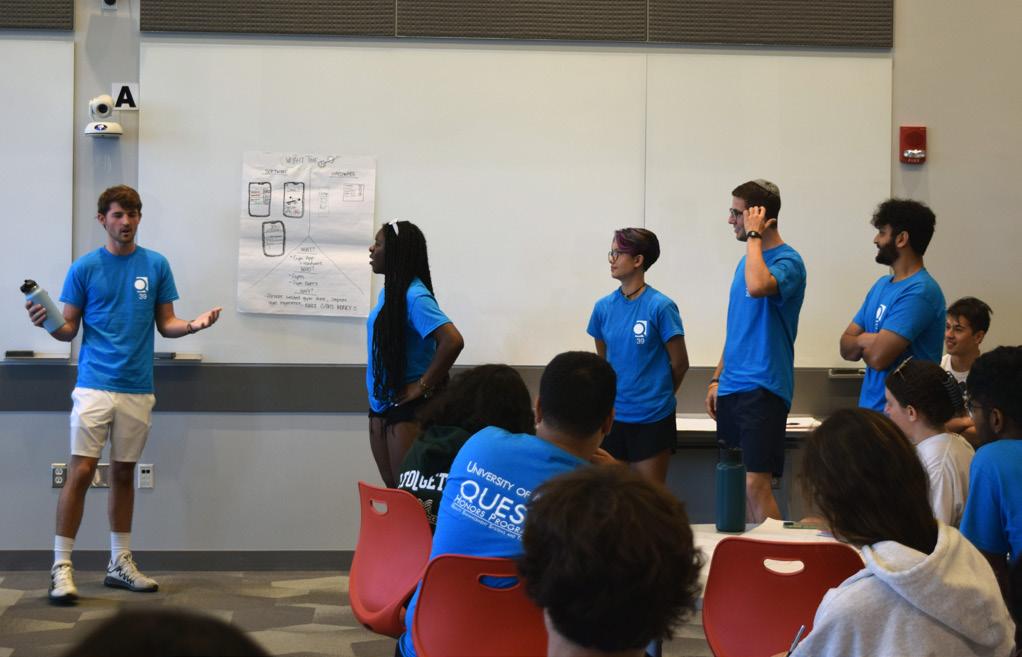
Project Spotlight
FosteringFriendships App Design
The first 190H project challenges students to use the voice of the customer and design thinking to design a digital or physical product. Cohort 39 team QUEST Foot Forward created FosteringFriendships, an app meant to connect foster children and parents with helpful resources and a community of people going through the same thing. “The original idea came from my teammate, Abigail Manga, after she watched an episode of Meet the Fosters,” shared QUEST Foot Forward team member Matthew Weirich, electrical engineering ‘25 (Cohort 39). “But what separated our team and our project was how emotionally and personally invested we became as we did research and held interviews with experts and former foster children themselves. We realized we had the power to do something really impactful and meaningful through this project.”
After sending a cold LinkedIn message, Weirich helped connect his team to a wonderful mentor, a former foster child who now dedicates his life to helping foster children. “He happened to be working on a somewhat similar app and loved our ideas, even inviting us to join him in his highly-coveted Y-Combinator pitch. From our shared conversations and continued contact, we are excited to see him utilize some of our ideas in his real-life app to help as many foster children as possible.”
COURSE 2: BMGT438A/ENES489A Applied Quantitative Analysis
In the second QUEST course, students learn how to translate raw data into useful information. In addition to learning how to work with a client that is external to the University, students are given more independence in managing this process since we remove the mentor scaffolding of the 190H class.
The 18 projects completed this year involved data related to repeat customers, donor relations, ticket patterns, and more. The class focused on the importance of the full data science process, including addressing data quality and data privacy concerns. Through completing the QUEST data course, students learned how quantitative and qualitative data can be used in concert to make data-supported recommendations to their clients.
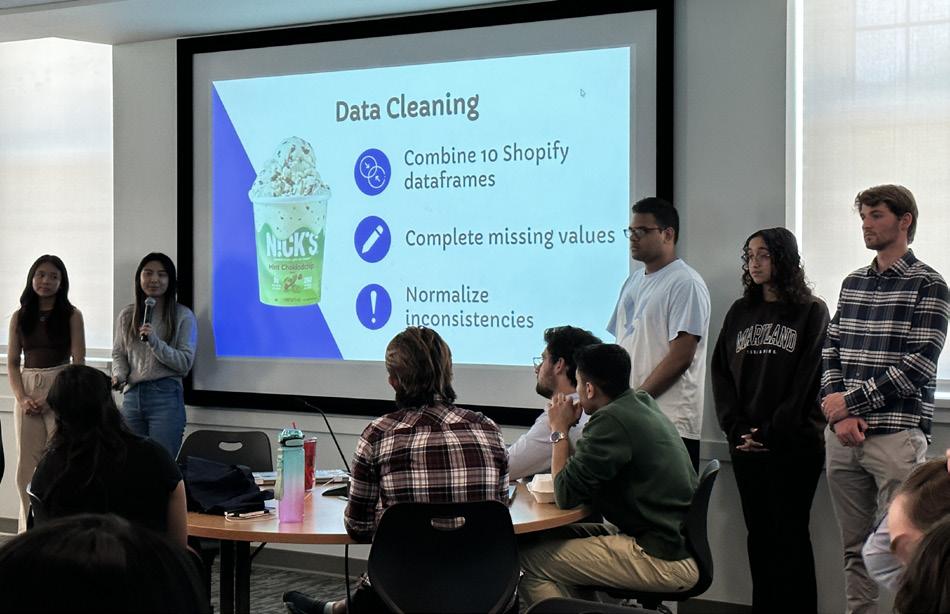
Improving Customer Loyalty for Burlap & Barrel
QUEST team QSpice6 had the opportunity to work with QUEST alumnus Ori Zohar, marketing ‘07 (Cohort 12), Co-Founder and Co-CEO of Burlap & Barrel, a single origin spice company. Burlap & Barrel was looking to better understand customer buying patterns in order to improve the conversion rate of one-time customers to repeat customers. The team used Pandas, Matplotlib, scikit-learn, and NumPy to analyze Shopify data about customer purchases, including discount and free shipping usage, amount spent, location, and more. Using this analysis, the team developed comprehensive recommendations for demographic-based marketing and promotional pricing. Zohar explained, "The students dug into the data and pulled out insights about how our customers behave - how they order, when they come back for their next order, and what motivates them. They found stories in the data."
It was a unique experience for the students to have a QUEST alumnus as their project champion. “Working with a QUEST alum was really helpful!” shared Sareet Nayak, computer science ‘24 (Cohort 38). “Since [Zohar] had already experienced the same things we had as a student, he was very proactive, ensuring we wouldn’t be left in the dark at any point.”
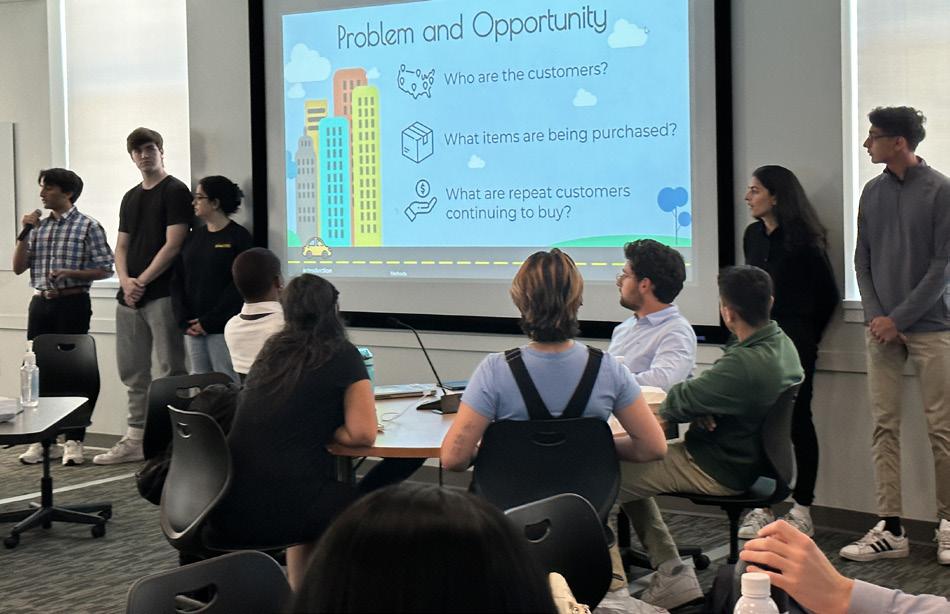
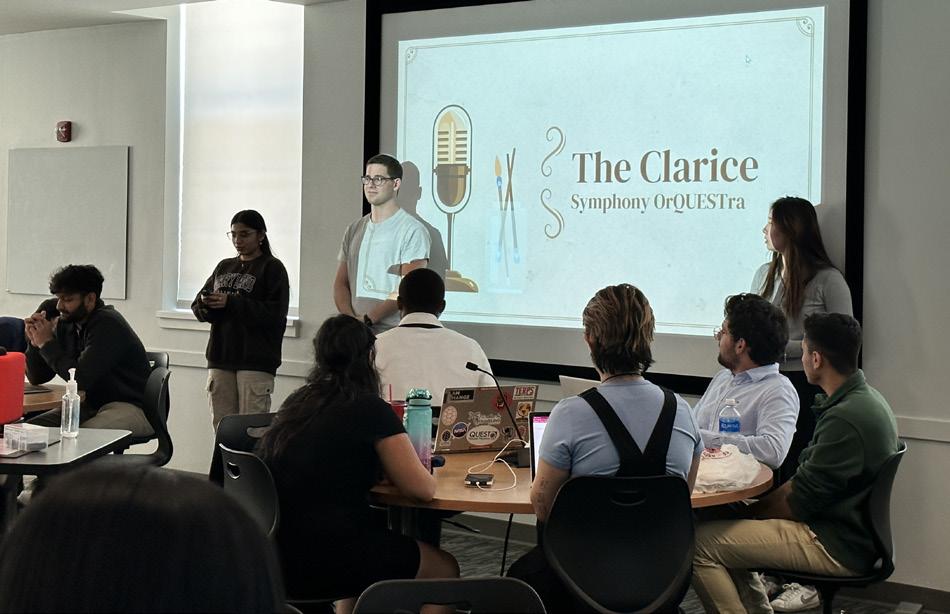
COURSE 3: BMGT/ENES390H Designing Innovative Systems
In the third course in the QUEST curriculum, students learn about the value and complexity of a systems thinking approach when solving problems and designing systems. By drawing upon the disciplines of students in the program, we can reveal the biases of the different disciplines and help bring together the different perspectives of business, technology, and science.
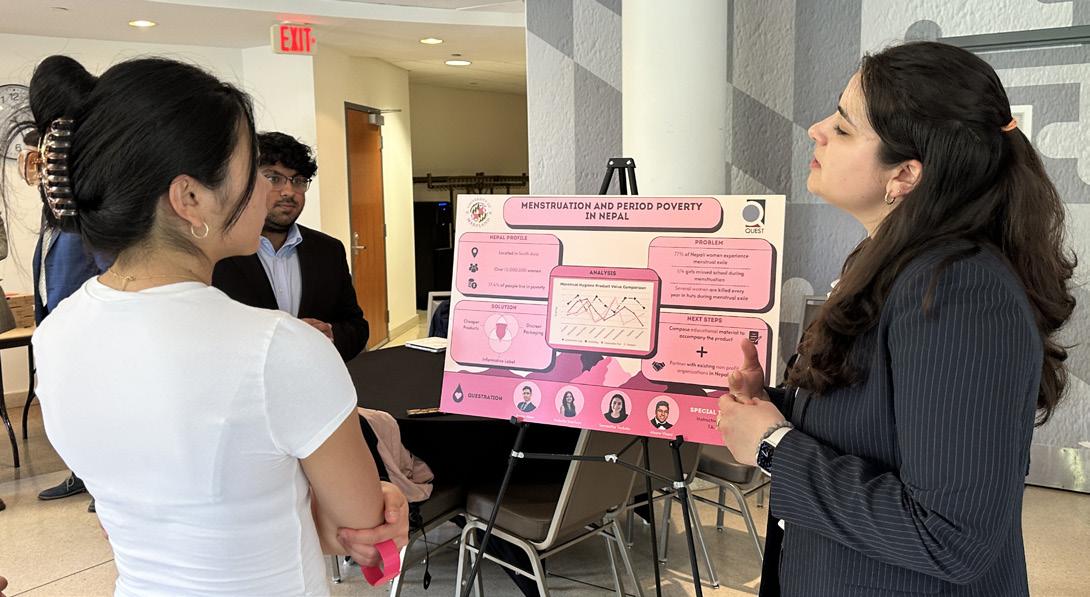
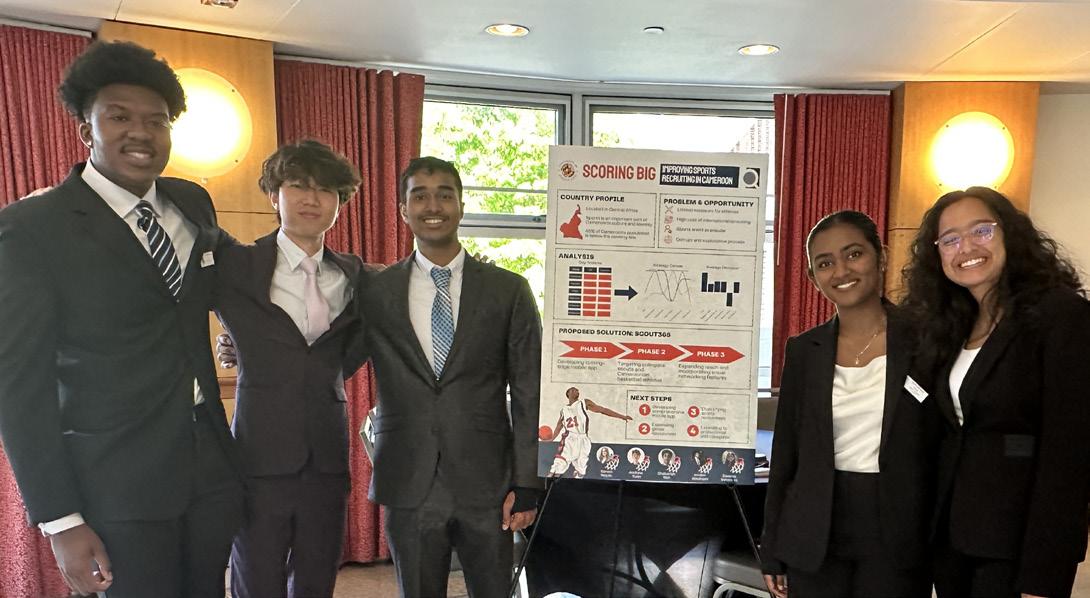
Project Spotlight
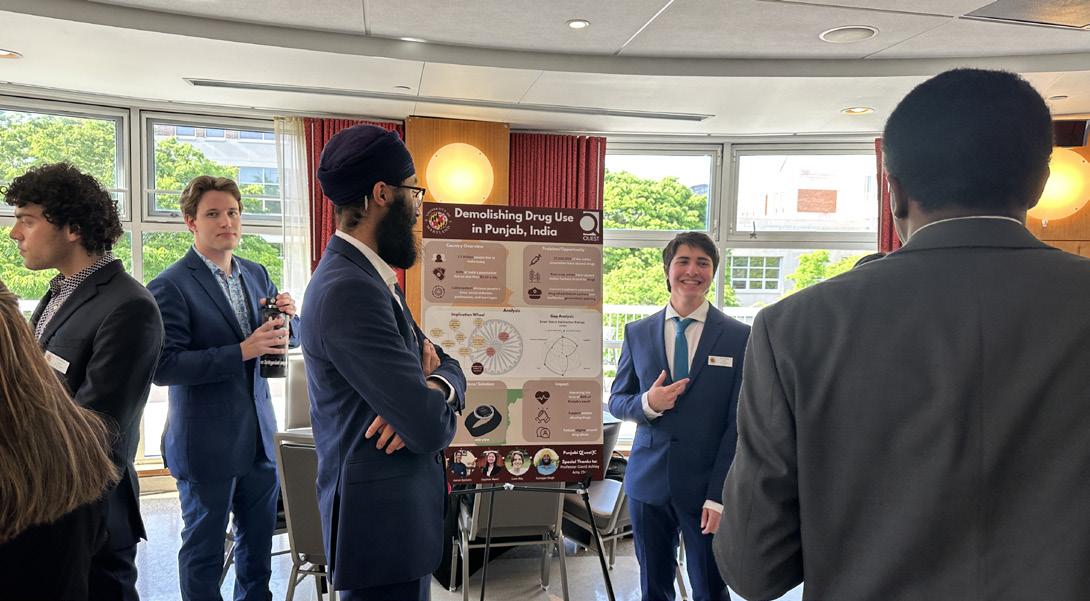
Tackling Drug Use in India
Team Punjabi Q[uest]C aimed to tackle the opioid crisis in Punjab, India. Team member Ayman Bootwala, mathematics and economics ‘24 (Cohort 38), drew from his own experience traveling to India for inspiration about the project topic. “Having traveled to India many times, I have seen poverty in India first hand and have heard the stories of my father’s battle with poverty. Being able to work on an issue that affects a large population of India was extremely meaningful to me.”
The team explored several product ideas that could help reduce the stigma around drug abuse and support those in drug rehabilitation programs. “What I will take away from this project is all of the analysis tools we learned. We used an implications wheel to see how people would use our products as well as a gap analysis to see how our products would fit into the general market,” shared Bootwala.
For the projects in this course, student teams selected a product or resource to be introduced into a developing country to improve its citizens’ lives and considered the system-level implications. The topics ranged from bringing new sources of power through solar panels in India to improving education in Chad to increasing Internet access in Ghana. Student teams used a combination of qualitative and quantitative research to propose a strategy for driving positive change in those countries through their product ideas.
COURSE 4: BMGT/ENES490H QUEST Capstone Professional Practicum
One of the signature QUEST experiences, the QUEST Capstone Professional Practicum allows students to work with clients for a full semester to address organizational challenges through process improvement, systems design, data analysis, and innovation. Teams work directly with clients to understand the opportunity, research the industry and relevant technologies, develop and evaluate possible solutions, and make final recommendations.
Through site visits and meetings, QUEST students completed 18 projects for 11 companies this academic year. These projects, based everywhere from South Africa to Hunt Valley, Maryland, to Houston, Texas provided students with the opportunity to tackle real-world problems and provided companies with tangible benefits. Project topics included improving workflow efficiencies and inventory planning, utilizing predictive analytics, integrating artificial intelligence into apps, designing customer feedback loops, and more. Student teams did an excellent job working with repeat clients as well as cultivating relationships with new clients.
SPECIAL THANKS TO:
FALL PROJECT SPONSORS
18 capstone projects
11 companies
100% of clients would like to return for another project
SPRING PROJECT SPONSORS
BAE Systems
CNH Industrial
D&H Distributing
Get Real Health
McCormick
Middle River Aerostructure Systems (MRAS)
Thales
Tronox
Tulkoff Food Products
BAE Systems (2 projects)
Capital i
D&H Distributing
Get Real Health
McCormick
SX Industries
Thales
Tronox
McCormick & Company
McCormick returned as a QUEST project sponsor this year, partnering with our students for projects in both the fall and spring semesters. In the fall, Team “The Spice is Right” analyzed spice properties and data from sensors at the Hunt Valley, Maryland plant to understand how plant conditions such as temperature and humidity relate to line performance. The team was then able to estimate that over $750,000 could be saved annually by implementing more climate control measures at the plant. The team was awarded Most Outstanding Capstone by a panel of QUEST alumni during final presentations.
According to team member Jessica Strongin, chemical and biomolecular engineering ‘23 (Cohort 36), “Working with McCormick provided me with a unique ability to apply what I learned in my chemical engineering classes and fuse it with QUEST’s focus on data science. Not only did I sharpen my analytical skills, but I also had the opportunity to dive deep into understanding how data impacts a company’s decision making.”
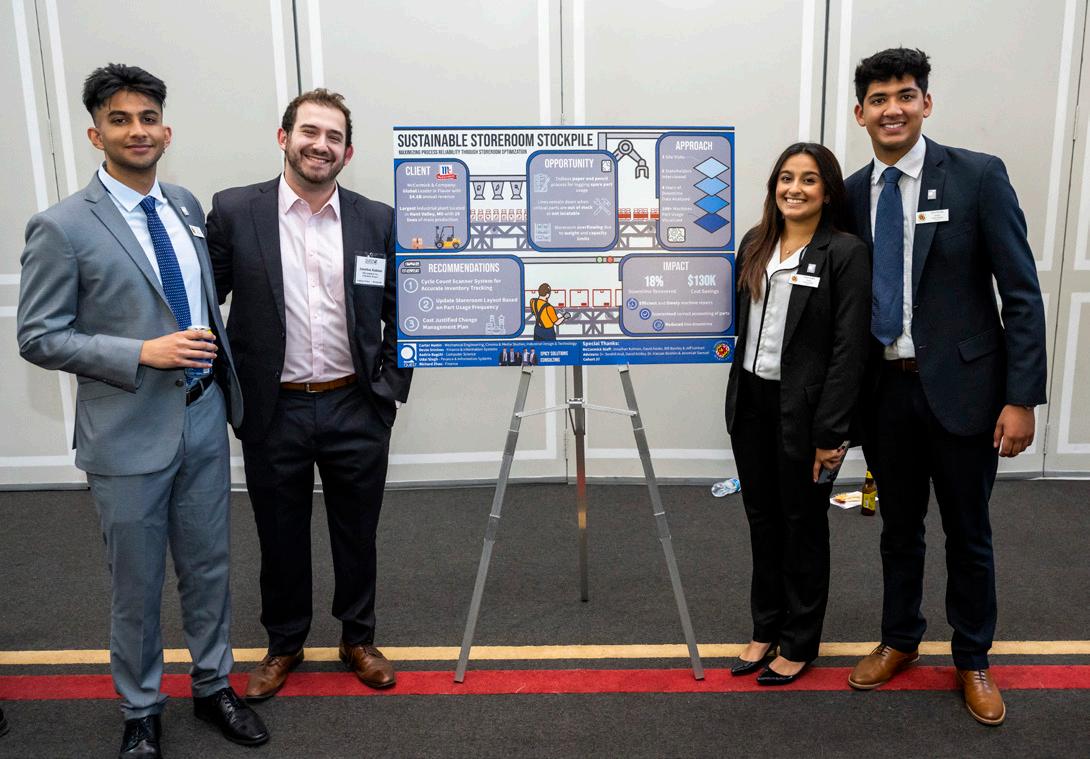
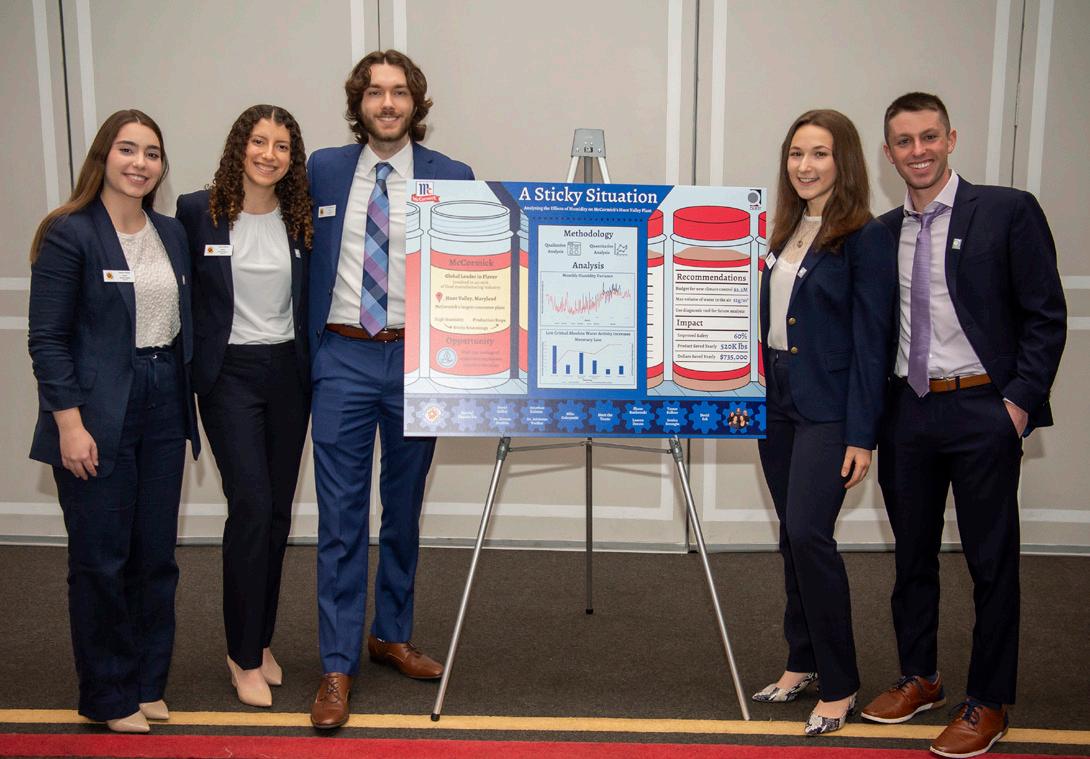
In the spring semester, Team “Spicy Solutions Consulting” worked on optimizing the spare parts storeroom at the Hunt Valley plant. After conducting stakeholder interviews and analyzing historical data on production lines and part usage, the team recommended several layout changes as well as the implementation of a new cycle count-based inventory management system that will enable real-time tracking of inventory levels.
“Our partnership with QUEST gives us the opportunity to get fresh, creative perspectives on some of the problems we experience every day,” shared Jonathan Kalman, project champion and Performance Manager at McCormick “Through intense data analysis and hands-on testing, the students were able to identify and extract considerable financial savings for our site. This has allowed us to cost-justify improvements for the HVAC system and a digital storeroom cycle counting system for the Hunt Valley plant, both of which will save our site money and raise the morale of our employees.”









